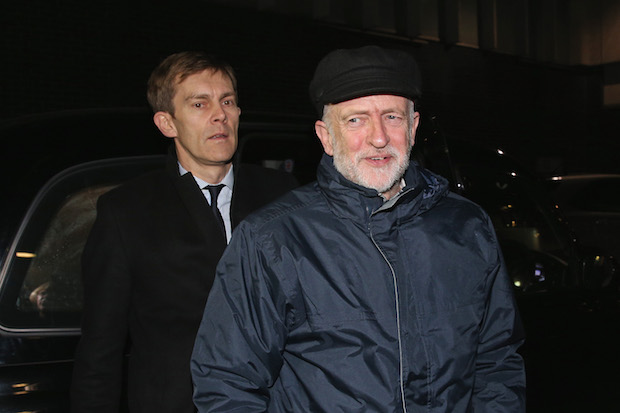Few really expected Jeremy Corbyn to pull out of the Stop the War fundraising dinner, which he attended last night. He used to chair the coalition, and hasn’t made any comment since becoming leader to suggest that he now disagrees with its aims and objectives. This, as Freddy wrote recently, simply shows that the new leader is sticking to what he believes, however wrong, rather than wobbling all over the place at the first sniff of power. Fewer people, perhaps, predicted that the Labour leader would release a defiant statement praising the organisation:
‘The Stop the War Coalition has been one of the most important democratic campaigns of modern times. It has brought hundreds of thousands of people on to the streets time and again. It has organised protests and lobbies in every part of the country, including by military families. Most of all, it has been shown to be right in opposing more than a decade of disastrous wars – in Afghanistan, Iraq and Libya – while many of its most vociferous critics supported them. The anti-war movement has been a vital force at the heart of our democracy. Branding it as somehow illegitimate is an attempt to close down democratic debate and campaigning.’
Those 111 words could be condensed quite easily into just two, which would read ‘screw you’. Corbyn wasn’t going to listen to his critics, even as they ramped up their demands for him not to attend. So why were they bothering at all?
The row over Stop the War tells us a lot more about Jeremy Corbyn’s enemies than it does about him. We already knew that the Islington North MP doesn’t change his mind much. We already knew that he doesn’t like military intervention, especially when the West is involved. We have learned in the past few days that the Labour leader is not in any mood to compromise with his parliamentary party, and even though he doesn’t enjoy face-to-face confrontations very much, he’s happy to stand up to them in forceful statements issued to the press.
But what his critics want to do is highlight the more unpalatable side of the Labour leader, which is his judgement in who he has as his friends and which organisations he supports. He himself is a fan of a ‘kinder politics’, and spends a fair bit of time scolding people like John McDonnell and Ken Livingstone who seem to accidentally on purpose break that rule. But he also chooses to continue supporting organisations like Stop the War when other left-wingers like Caroline Lucas and Peter Tatchell have withdrawn their backing. And by creating a row over something that he was always gong to do, his critics are able to broadcast how malign the allies that he keeps are.
Those MPs who were urging Corbyn not to attend the party were also trying to show the Labour leader that they won’t let him change their party’s ethos without a fight. They also wanted to show the wider public that Stop the War may have links with the Labour leader, but its links with Labour more widely are far more tenuous. This won’t be the last stand-off that these MPs create with their leader. And it certainly won’t be the last time he faces them down.







Comments